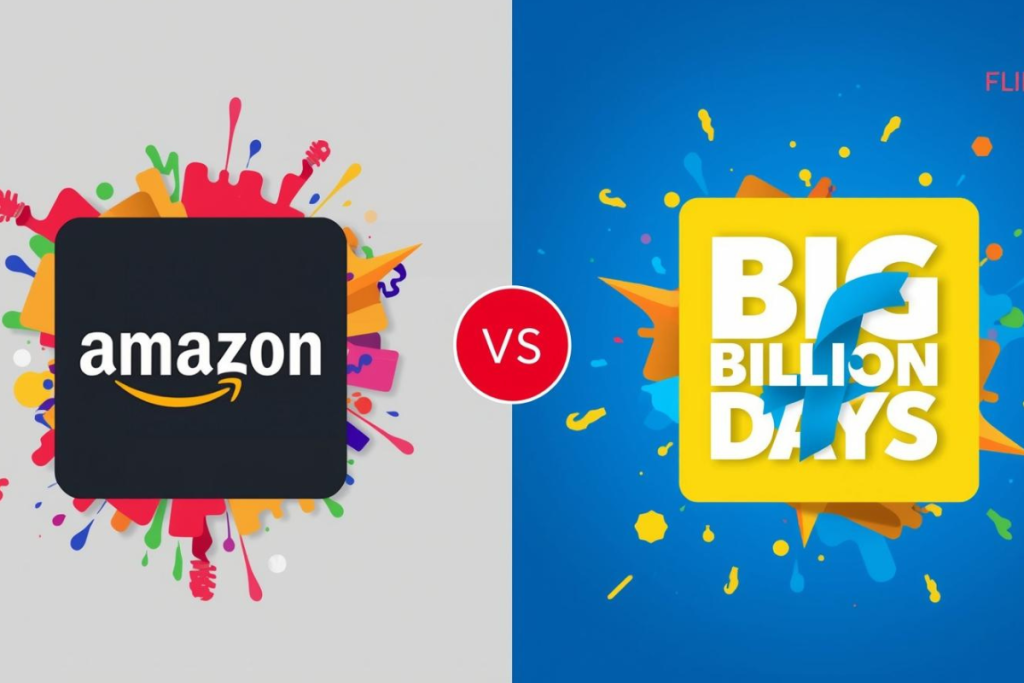Introduction
Every year, as the festive season begins in India, millions of shoppers wait for one of the biggest rivalries in the e-commerce space: the Amazon Great Indian Festival and the Flipkart Big Billion Days. These mega sales have grown beyond simple discount events. They now represent an annual shopping carnival that sets records for sales, traffic, and customer engagement. For brands, sellers, and customers alike, these events are more than transactions they are moments that shape consumer behavior and redefine India’s online retail landscape. But the question remains: which platform truly delivers the better experience?
Amazon vs Flipkart: Who Offers the Better Discounts?
Discounts are the heartbeat of these mega sales. Both Amazon and Flipkart attract customers by slashing prices across categories, but their approaches differ.
- Amazon tends to focus on premium electronics, appliances, and global brand tie-ups. Flagship smartphones, laptops, and smart home devices are usually offered at some of the lowest prices of the year. Bundled offers with extended warranties and accessories are common.
- Flipkart, in contrast, leans on aggressive pricing strategies across mid-range smartphones, fashion, and home essentials. Its discounts are designed to appeal to the cost-conscious buyer, making it especially popular with middle-class households.
The battle is not just about percentages it’s about creating urgency through lightning deals, early access for Prime or Plus members, and limited-time price cuts that keep customers constantly engaged.
Product Range: Which Platform Has the Edge?
When it comes to product range, both platforms boast vast inventories, but each has a distinct edge.
- Amazon benefits from its global supply chain and international partnerships, offering a wider variety of global electronics, imported brands, and niche categories. It also has stronger coverage in premium categories like smart TVs, tablets, and global fashion labels.
- Flipkart, however, dominates in lifestyle, regional brands, and affordable categories. It appeals to the Indian mass market with competitive pricing on clothing, footwear, and daily-use goods, often tapping into local sellers and regional manufacturers.
For premium shoppers, Amazon provides greater variety, while Flipkart is often the go-to choice for value-driven buyers.
Delivery & Logistics: Who Wins on Speed and Reach?
Logistics is among the most vital elements of extensive online sales. With countless orders made in just a few days, efficiency turns into a crucial element.
- Amazon utilizes its established Fulfilled by Amazon (FBA) system, guaranteeing quicker processing and shipping, especially for Prime members in urban areas. Delivery on the same day or the following day is a key advantage.
- In contrast, Flipkart has made significant investments in Ekart Logistics, which has expanded its presence in Tier-2 and Tier-3 cities. Its power is in enabling customers from smaller towns to fully engage in the mega sale.
In the end, Amazon excels in urban areas, whereas Flipkart has established a solid presence in semi-urban and rural regions of India.
Payment Options & Cashback: Where Do Shoppers Save More?
Payment flexibility is a key part of the customer experience.
- Amazon promotes its Amazon Pay Later feature along with tie-ups with leading banks for instant discounts, EMI options, and cashback on Amazon Pay wallet transactions.
- Flipkart offers Flipkart Pay Later, similar banking partnerships, and a wide range of EMI options, often combining them with exclusive wallet cashback deals.
Both platforms compete to make payments seamless and rewarding, and for most customers, the choice depends on which bank or wallet they prefer.
Customer Experience: Which Festival Feels More Seamless?
The success of these festivals doesn’t only rely on discounts it also depends on the shopping experience.
- Amazon is known for its user-friendly interface, strong customer service, and easy return policies. It offers a sense of reliability and smooth navigation, making it a safe choice for first-time online shoppers.
- Flipkart emphasizes festival engagement. With regional language support, gamified rewards, and interactive campaigns, it creates a celebratory atmosphere that resonates with Indian cultural traditions.
For users seeking seamless functionality, Amazon has the edge, but Flipkart’s festive approach builds excitement and loyalty.

Shopper Stories from Past Mega Sales
- Ravi from Delhi purchased a premium iPhone on Amazon, praising its quick delivery and bundled exchange offers.
- Sneha from Pune found Flipkart’s discounts on fashion unbeatable, buying more clothes and accessories than she planned.
- Kumar from Lucknow relied on Flipkart for appliances because of its strong delivery presence in smaller cities.
- Ananya from Bangalore shopped smart by splitting her purchases—gadgets on Amazon, lifestyle goods on Flipkart maximizing savings across both platforms.
These experiences highlight a key point: loyalty often takes a backseat to value, and many customers use both platforms strategically.
Conclusion
The Amazon Great Indian Festival and Flipkart Big Billion Days have become India’s most anticipated retail events, each with unique strengths. Amazon appeals to premium shoppers with a global range, faster deliveries, and reliability, while Flipkart resonates with mass-market buyers through deeper discounts, regional accessibility, and festival-style engagement.
For customers, the winner is often not one platform over the other, but rather the ability to navigate both intelligently for maximum value. For businesses and sellers, these sales highlight the importance of innovation, personalization, and building trust with customers.
In the bigger picture, the rise of such digital platforms reflects a larger trend of how technology is shaping consumer behavior and opportunities. Similarly, in the world of work, platforms are enabling professionals to access opportunities globally. This is where Wiraa, a global remote job platform, comes in. Just as Amazon and Flipkart connect millions of shoppers with sellers, Wiraa connects skilled professionals with businesses worldwide. It provides flexibility, access, and global exposure to individuals seeking growth in a digital-first economy. In a rapidly changing marketplace, whether in shopping or in careers, platforms like Wiraa are ensuring that opportunities are no longer bound by geography they are defined by connection and innovation.




